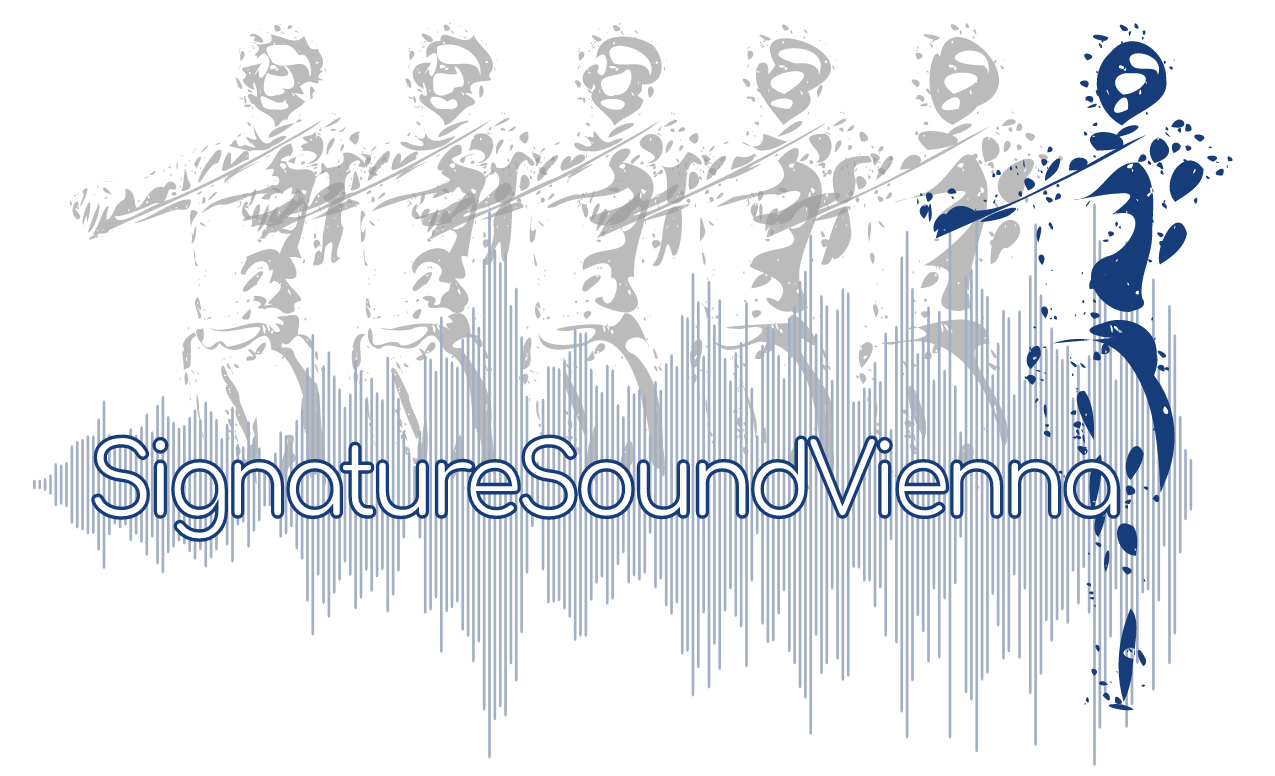FWF Signature Sound Vienna
Die Wiener Neujahrskonzerte unter der quantitativen Lupe

| Project number: | FWF P 34664-G |
| Project leader: | David M. Weigl |
| Research institution: |
Institut für musikalische Akustik – Wiener Klangstil (IWK) Institut für Musikwissenschaft und Interpretationsforschung IMI) |
| Project Team: | David M. Weigl, Chanda VanderHart, Werner Goebl, Markus Grassl, Matthäus Pescoller, Delilah Rammler, Fritz Trümpi |
| Date of approval: | 10.05.2021 |
| Project start: | 01.09.2021 |
| Project end: | 31.03.2025 |
| Scientific areas: |
102030, Semantische Technologien (30 %) 102035, Data Science (30 %) 605007, Digital Humanities (20 %) 604024, Musikwissenschaft (20 %) |
| Keywords: | Music Informatics, Semantic Web, Digital Humanities, Digital Musicology, Linked Data, Music Information Retrieval |
| Project data: | GitHub Organization (source code, score encodings). More tba. |
The same procedure as every year?
Das Neujahrskonzert der Wiener Philharmoniker ist seit Jahrzehnten ein internationaler Fixpunkt am Neujahrstag und erfreut mit seiner jährlichen Live-Übertragung ein Millionenpublikum in beinahe 100 Ländern weltweit. Es ist gleichermaßen geprägt von Beständigkeit und Wandel. Einerseits getragen vom Orchester der Wiener Philharmoniker, deren Mitglieder sich über acht Jahrzehnte nur langsam veränderten, wird es andererseits von wenigen berühmten Dirigenten geleitet, die in der ferneren Vergangenheit jahrelang im Amt waren, aber seit Mitte der 1980er Jahre jährlich wechseln. Über die Jahrzehnte hinweg wuchs das Repertoire allmählich an, gleichzeitig wiederholen sich jedoch einige Lieblingsstücke, so wie der Donauwalzer oder der Radetzkymarsch.
Die gesammelten Aufnahmen dieser Konzertreihe bieten eine reiche Ausgangsbasis für musikwissenschaftliche Analysen. Spielt das Orchester immer gleich, the same procedure as every year, oder lassen sich Veränderungen im Laufe der Zeit nachvollziehen? Erklären sich diese durch musikhistorische Tatsachen, etwa, wer das Orchester dirigierte oder als Konzertmeister wirkte? Ist die Handschrift der Wiener Philharmoniker bei der Aufführung dieser heutzutage scheinbar untrennbar mit ihnen verbundenen Kompositionen herauszulesen, wenn wir Ihre Darbietungen mit jenen anderer Orchester vergleichen? Wie steht es mit Wiener Orchestern im internationalen Vergleich—hat Wien hier wirklich einen eigenen Klang?
Die wissenschaftliche Aufarbeitung dieses ansprechenden Korpus ist eine große Herausforderung. Die digitale Musikforschung hat begonnen, neue Wege der computergestützten Musikwissenschaft zu etablieren. Wir machen uns diese Vorarbeiten zu eigen, kombinieren Bausteine aus drei verschiedenen digitalen Bereichen, um dadurch Analysen großer Datenmengen zu ermöglichen. Semantische Kodierung von Partituren macht Musikstücke sowohl für die Maschine als auch den Menschen verständlich. Die Musikinformatik ermöglicht Computern, aus Musikaufnahmen automatisiert zum Beispiel Tempo oder Dynamik zu jedem Zeitpunkt der Interpretation zu berechnen. Letztlich ermöglicht Web Science die Verknüpfung dieser Musikinformationen mit anderen historischen und kulturellen Daten. Dies beinhaltet zum Beispiel Informationen über Personen, die an einem bestimmten Konzert beteiligt waren, oder über die Art und Weise, wie das Konzert in Zeitungsrezensionen verarbeitet wurde.
Diese Technologien können musikwissenschaftliches Verständnis nicht ersetzen. Vielmehr stellen sie neue Analysewerkzeuge bereit: Neben detaillierter Erkundung einzelner Aspekte einiger Aufnahmen (“close listening”) können musikwissenschaftliche Fragestellungen an großen Sammlungen getestet werden (“distant listening”). Die Verflechtung von (historischer) Musikwissenschaft, die aus diesen Perspektiven neue Fragen schöpft, und Musikinformatik, die Tools zur Beantwortung dieser Fragen entwickelt, bildet den Kern unseres Projekts.
DH2023 Workshop, 11. July 2023
Publications
Goebl, Werner and Weigl, David M. (2025)
"Let’s do the ScoreWarp again! Shifting notes to performance timelines,"
In D. Lewis, A. Plaksin, & S. Stremel (Eds.), Music Encoding Conference 2025. Book of Abstracts (pp. 49–55). DOI↗
Page, Kevin R.; Pugin, Laurent; Weigl, David M. and Lewis, David (2025)
"Annotating Music Scores: Representing and interacting with annotations with MEI and Verovio,"
In D. Lewis, A. Plaksin, & S. Stremel (Eds.), Music Encoding Conference 2025. Book of Abstracts (pp. 222–225). DOI↗
Goebl, Werner; Weigl, David M.; VanderHart, Chanda, and Churan, Luo (2024)
"解析维也纳的标志性声音 — 数字音乐学与表演科学的FAIR方法 (Scrutinizing Vienna’s Signature Sound:FAIR Approaches to Digital Musicology and Performance Science),"
中国音乐 (Chinese Music), 152-162.
Weigl, David M.; Page, Kevin R., and Lewis, David (2024)
"Annotating digital music notation: past, present and future approaches (abstract),"
in International Association for Music Libraries, Archives, and Documentation Centres (IAML) .
Goebl, Werner and Weigl, David M. (2024)
"mei-friend: An Interactive Web-based Editor for Digital Music Encodings,"
Journal of Open Source Software 9(98), 6002. DOI↗
VanderHart, Chanda and Weigl, David M. (2023)
"A Digital Corpus for a Cultural Tradition: Vienna's Neujahrskonzert meets Digital Musicology. (abstract),"
in Jahrestagung der Gesellschaft für Musikforschung 2023.
Weigl, David M. and Goebl, Werner (2023)
"mei-friend v1.0: Music Encoding in the Browser (abstract),"
in Joint TEI-MEC Conference 2023.
Lewis, David; Page, Kevin; VanderHart, Chanda, and Weigl, David M. (2023)
"Collaborative approaches to discourse: Music scholarship using performance recordings and Linked Data annotations (abstract),"
in Digital Humanities Conference 2023. DOI↗
Weigl, David M.; VanderHart, Chanda; Rammler, Delilah; Pescoller, Matthäus, and Goebl, Werner (2023)
"Listen Here! A Web-native digital musicology environment for machine-assisted close listening,"
in DLfM '23: Proceedings of the 10th International Conference on Digital Libraries for Musicology p. 109-118. DOI↗
Goebl, Werner and Weigl, David M. (2023)
"The mei-friend Web Application: Editing MEI in the Browser (abstract),"
in Music Encoding Conference 2022. DOI↗
VanderHart, Chanda; Nurmikko-Fuller, Terhi, and Weigl, David M. (2023)
"Hand in Hand: Strauss’ Kaiser Walzer as a case study of interdisciplinary collaboration in digital musicology (abstract),"
in Digital Humanities Conference 2023. DOI↗
Weigl, David M.; VanderHart, Chanda, and Goebl, Werner (2023)
"Methoden und Ziele der digitalen Musikwissenschaft – Ein Marktplatz aktueller Forschung.
Let's be MEI-Friends! Musikcodierung leicht gemacht,"
(Brochure for the event as part of the annual conference of the Gesellschaft für Musikforschung 2023;
Fachgruppe Freie Forschungsinstitute, Fachgruppe Digitale Musikwissenschaft in cooperation with NFDI4Culture). DOI↗
Weigl, David M.; VanderHart, Chanda; Pescoller, Matthäus; Rammler, Deliah; Grassl, Markus; Trümpi, Fritz, and Goebl, Werner (2022)
"The Vienna Philharmonic Orchestra’s New Year’s Concerts: Building a FAIR Data Corpus for Musicology,"
in DLfM2022: 9th International Conference on Digital Libraries for Musicology (ACM Digital Library, Prague) p. 36-40. DOI↗
